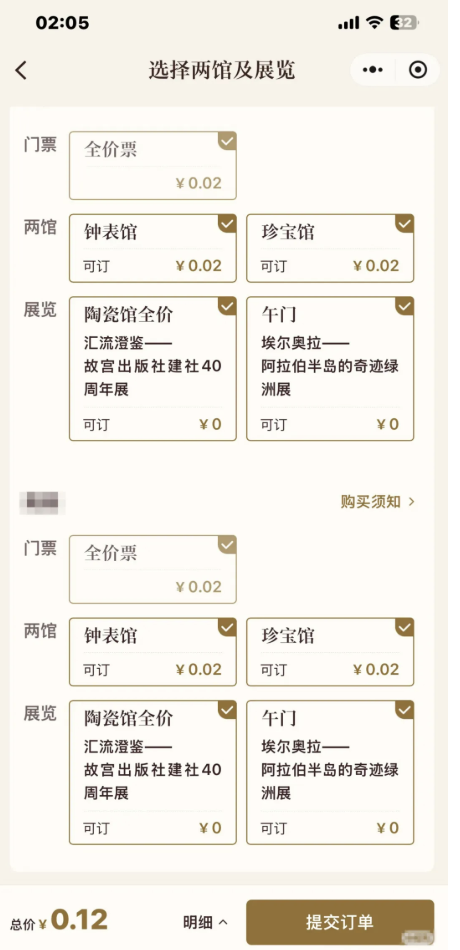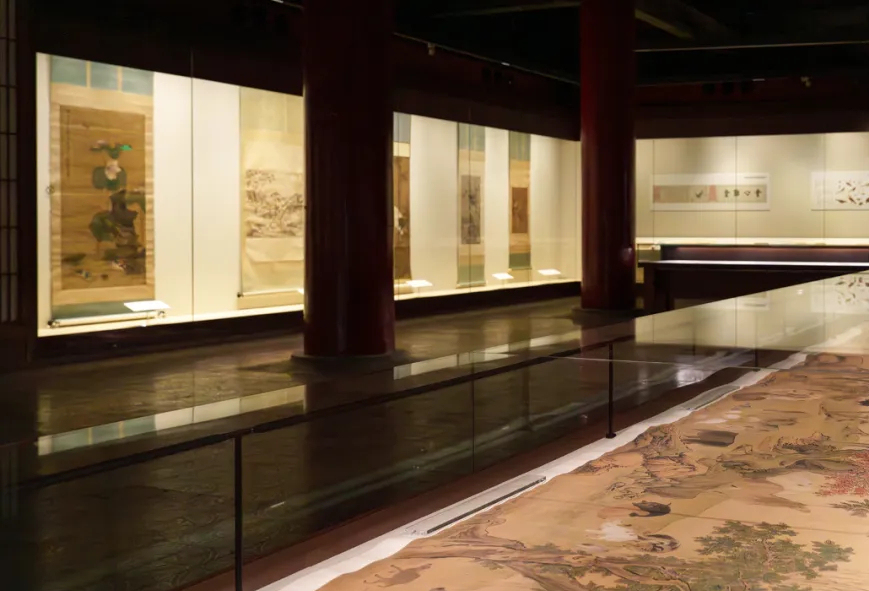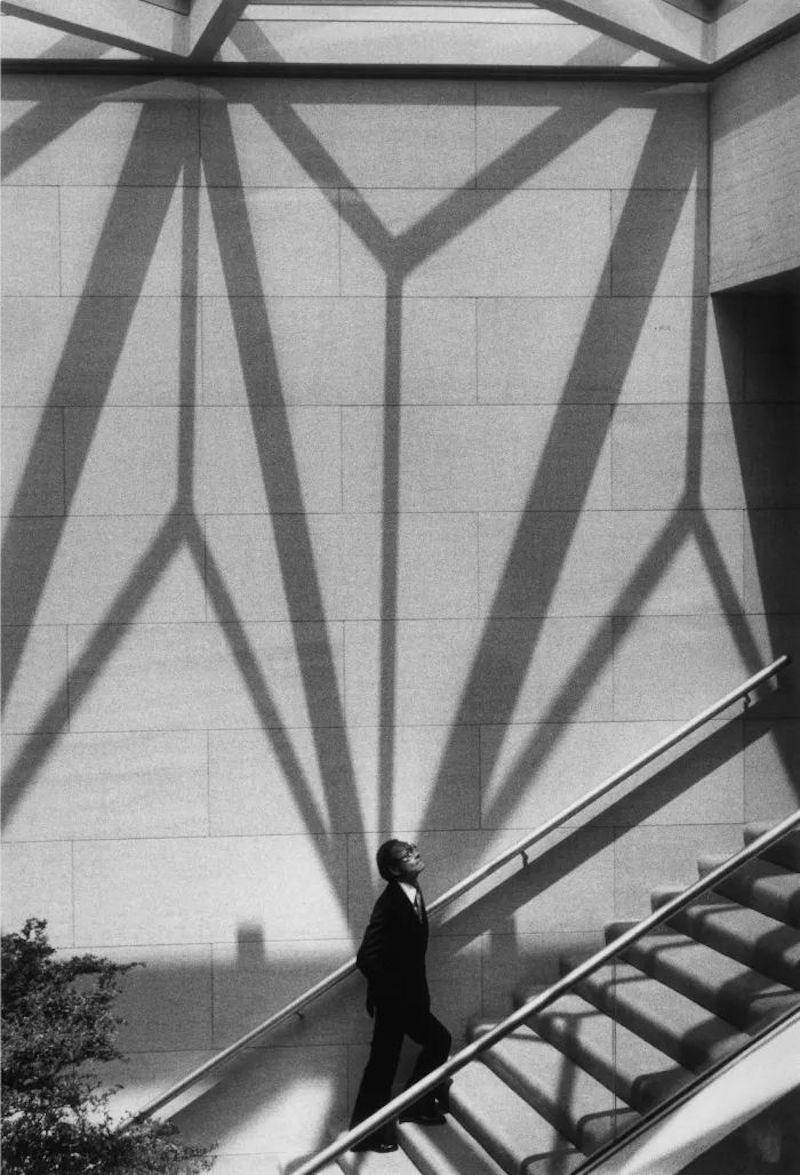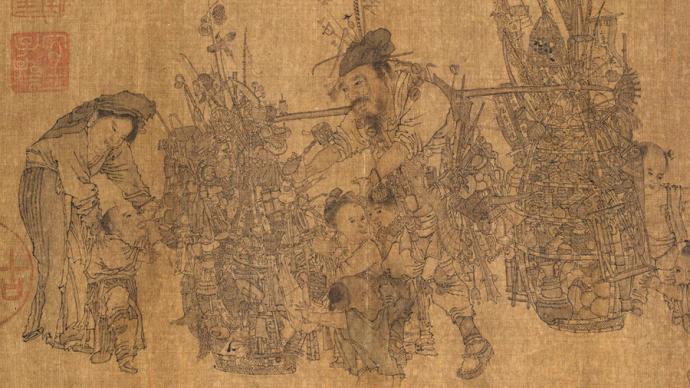
At midnight, tourists rushed to place orders on their mobile phone screens. The ticket price of the Palace Museum was shown to be an incredible 0.02 yuan. Behind this joke-like number, we can see the consistent management problems of a popular museum. The Palace Museum has been implementing an extremely strict reservation system for visiting in recent years, but it is extremely difficult to make an appointment. When tourists posted the record of buying tickets for 0.02 yuan on social media, we may not only see a system failure.
The Palace Museum has gone from having the stolen door and the typo door in the past to the Ge Kiln door, the running door, the car door... to the continuous "difficulty in entering" in recent years, and to today's "two cents ticket"... This forms a huge contrast to the solemn, majestic, and luxurious image of the Palace Museum. Why has it come to this?
According to Beijing News and other Beijing media, at 2 a.m. on July 22, Mr. Chen (pseudonym) quickly placed an order and bought tickets for two people at the Forbidden City for 0.12 yuan, including 2 full-price tickets, 2 tickets to the Clock and Watch Museum and 2 tickets to the Treasure Museum. Other exhibition tickets were even completely free. On social platforms, tourists from all over the country posted screenshots of their "fetching wool". Some were surprised to find that the system even allowed reservations for tickets on Monday, when the museum was supposed to be closed. Even more confusing is that the system page also shows a requirement to check the negative nucleic acid test certificate within 72 hours - an outdated epidemic prevention requirement that has long been canceled.

Network screenshots

Network screenshots
The Palace Museum responded urgently on the morning of July 22, confirming that the ticket purchase applet had an abnormal upgrade, which resulted in errors in the display of ticket amounts, ticket types, and ticket prices from July 22 to 28. The official statement said that it would contact the audience who purchased tickets during the abnormal period to regenerate the order and "deeply apologize."
The malfunction occurred during the peak summer tourism season, when tickets to the Forbidden City were already hard to come by. The unusually low price quickly spread on social media, attracting many tourists to place orders. Some tourists even joked on social media: "Let's see what's going on, and make an appointment on Monday."
In its response this morning, the Palace Museum confirmed the system anomaly, stating that the mini-program functionality has returned to normal, and promised to contact audiences who purchased tickets during the abnormal period through the customer service number 400-950-1925 to regenerate the correct order.
The ticketing system failure is just the latest manifestation of the management problems of the Forbidden City in recent years. Looking back over the past decade, the Forbidden City has been caught in a whirlpool of "multiple gates" - from the theft gate, the typo gate, to the Ge Kiln gate, the running gate... Management loopholes have been exposed one after another. In the "driving into the Forbidden City" incident in early 2020, the then director apologized for it, admitting that the incident "reflected the shortcomings of our internal management and social services" and announced that the deputy director and the director of the security department who were responsible for the leadership would be suspended for inspection.
At the time, an insider admitted: "The Palace Museum does not lack strict systems, but what it lacks is strict implementation."
Another fact is that the Palace Museum has been "extremely difficult to enter" in recent years and has implemented a strict reservation system for visits. Tickets must be reserved in advance through the Palace Museum's online ticketing website or the Palace Museum's WeChat audience service account with real name. The reporter from The Paper has opened the "Palace Museum Audience Service Account" many times recently, but all tickets for the next seven days have been sold out.

A reporter from The Paper saw at the Forbidden City on July 6 that some tourists who had not reserved tickets walked from Tiananmen Square through the Duanmen Gate to the Wumen Gate to "try their luck" to see if they could buy tickets on the spot, but they still had to stop outside the Wumen Gate.
Regarding the problem of scalpers grabbing tickets and squeezing out quotas that tourists believe may exist, Su Yi, director of the Digital and Information Department of the Palace Museum, said in an interview earlier that to deal with situations such as scalpers grabbing tickets and machines swiping tickets, the Palace Museum adopts a combination of technical and human defense, with dedicated personnel on duty, and slowly releasing tickets manually from 8 p.m. every night, extending the ticket release time and improving the audience's ticket purchasing experience and success rate.

However, according to a report by Legal Daily on July 19, there are still many "scalpers" who grab tickets for the Palace Museum through various channels and sell them at a higher price: "As long as there are many 'hot sellers', we can basically reach 80 to 90 percent, which is completely enough. What's more, if we can't grab them manually, we can use technology to grab them almost 100 percent of the time." Chen Ning's income, who participated in the ticket grabbing, is calculated as follows: the ticket seller needs to pay Chen Ning at least 90 yuan for the ticket price (including 60 yuan for the ticket fee + 30 yuan for the handling fee). "My profit comes from this 30 yuan 'handling fee'. After paying 15 yuan for the ticket grabbing fee to the 'hot sellers', the remaining 15 yuan is the net profit. Whether the ticket seller is willing to sell for 150 yuan or 200 yuan has nothing to do with me. That is their profit. I just earn a stable income of 15 yuan per ticket. This is a 'no-cost business'. Although the 'profit per ticket has decreased', the 'volume has increased', and the total profit has increased instead of decreased. However, after the summer vacation, I will still contact customers myself to attract traffic, after all, the demand will decrease at that time."
From the report of Legal Daily, we can see that the Palace Museum has adopted a combination of technical and human defense to prevent ticket snatching, but the effect is not obvious.
Several tourism and cultural experts previously told The Paper that "the appointment system for popular museums is conducive to improving cultural relics protection and the visitor experience, but it cannot be a one-size-fits-all approach. In addition, the State Administration of Cultural Heritage has also notified that even the top museums can still combine appointments with on-site queuing."
Jing Lijia, associate professor at the Law School of Wuhan University, also told the Legal Daily recently that the fundamental solution to curbing "ticket scalpers" is to diversify the ways in which the public can obtain tickets, and avoid online reservations becoming the only channel. Specifically, each scenic spot and museum can formulate more reasonable reservation rules based on its own situation, using a combination of manual and system methods, and grading and classifying venues and crowds.
This incident exposed the technical loopholes in implementing a completely online ticket reservation system.
According to Beijing media reports, this failure is not an isolated incident. A recent report from the Beijing police showed that the ticketing systems of popular venues during the summer vacation were frequently attacked by "technical scalpers": for example, automated ticket grabbing software - black market gangs bypassed human-machine verification and placed orders in seconds to grab tickets (the Guo gang that Beijing police defeated on July 11).
The ticket office in front of the Meridian Gate of the Forbidden City has long been deserted, and in recent years it has been replaced by a digital system ticket queue. When tourists posted their 0.02 yuan ticket purchase records on social media, we saw not only a system failure, but also an opportunity to protest against a museum system that is too strict and lacks human warmth.
The adjustment of the museum's reservation policy is essentially an iteration of management tools, and the core proposition throughout is how to maintain the bottom line of cultural service quality amid fluctuations in visitor flow, that is, to find a fulcrum between cultural relics protection and visiting experience, and to find a combination of technological convenience and humanistic care.


